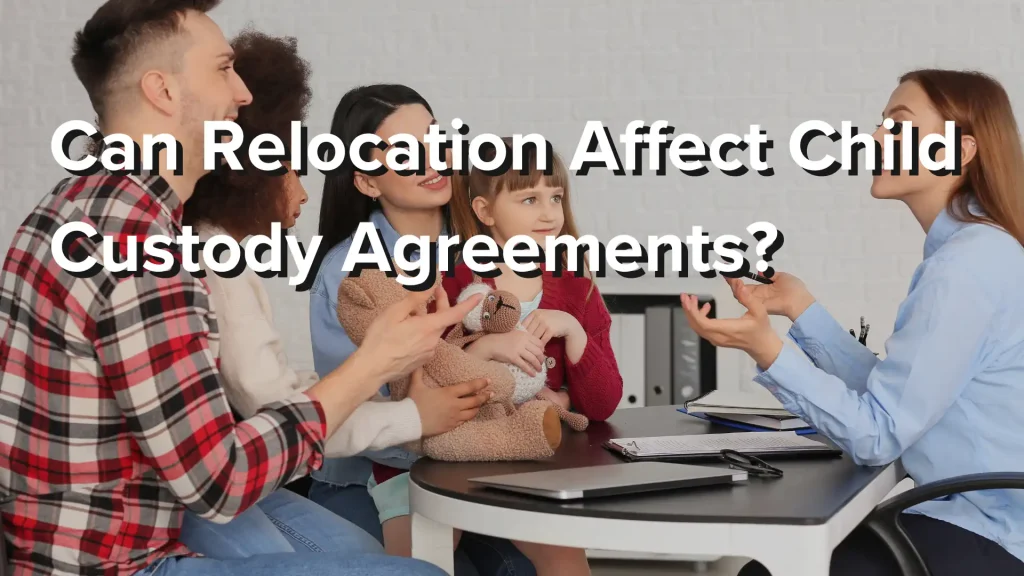
Sometimes, after the end of a relationship, a person needs a change of scenery. Circumstances have changed, and moving may be the best way to maintain your standard of living. No matter the reason, relocating after a divorce or custody agreement isn’t just a personal decision. It can have significant legal implications that affect child custody, especially in relocation child custody in NC, where moving even a short distance could require court approval or a modification of your agreement.
North Carolina courts prioritize the child’s best interests, meaning a parent’s decision to relocate may require legal review or modification of the custody agreement. It’s essential to understand how relocation impacts child custody and what steps you must take to comply with court orders. Especially when considering how North Carolina’s child custody laws affect relocation and parental rights.
What Counts as Relocation in NC Custody Cases?
For legal purposes, what does relocation mean in North Carolina? Does it count if you move to a new home down the street? What about moving to a new state? There is no specific statute of law governing relocation. Generally, relocation stipulations are dictated by the terms of a divorce or child custody agreement.
Most agreements involving children include a clause covering a “significant move.” A significant move often means moving far enough away to impact the current parenting schedule or a child’s regular routine. In North Carolina, a significant move may mean relocating to a new county or state, or a move that interferes with school attendance or visitation exchanges.
After a divorce or separation, it is not unusual for one partner to want to relocate for personal or professional reasons. However, a court-approved child custody agreement can make moving challenging. You need to understand the specific stipulations included in your arrangement. Moving can mean getting the other parent’s consent or modifying your existing court-ordered child custody agreement, depending on your custody situation.
Please read more about Grandparents’ Rights Cases here: Grandparents’ Rights in Custody Cases in North Carolina.
How to Request Relocation
The first step in relocating involves communicating with your child’s other parent. It may be challenging, but you must talk honestly about your move. If you have an amicable or working co-parenting relationship with your former spouse, speak to them about your relocation opportunity. Sometimes, working together can get the other parent’s consent and avoid drama and a legal battle.
There are situations where a parent disagrees or where it is unsafe for you to disclose your move. When parents disagree, or one wants to move to another state, or relocation could disrupt your current custody order, it is necessary to modify it. This process requires the parent to petition the court for a formal modification. The parent must also be prepared to prove to the court that the relocation is in the child’s best interests. This step may include showing how the move increases your earning potential or job opportunities, offers better schools, or a safe, more stable environment for the child.
Even without a formal custody agreement, it is best to get permission to relocate from the other parent or the court. The Uniform Child-Custody Jurisdiction and Enforcement Act allows co-parents to petition the court to return a child to North Carolina.
North Carolina courts carefully weigh the benefits and drawbacks of relocation. Judges tend to focus on the child’s stability, emotional well-being, and relationship with both parents before approving a new custody schedule.
Tips for Parents Considering a Move

Moving is already a hectic and overwhelming process. Adding child custody issues to the mix makes it even more stressful. For parents thinking about a significant move, there are some proactive steps you can take to make the process easier on you and your family. Consider the following:
Review Your Custody Order
Take the time to read your existing custody order carefully. Many orders include relocation clauses that require notice or consent for moves beyond a certain distance. Moving without following the steps in a current custody order can cause significant legal complications. Beyond custody disputes, relocating with your child without consent can potentially trigger kidnapping charges. It can also lead to potential disadvantages in court when seeking a child custody modification, especially when you don’t fully understand how North Carolina’s child custody laws affect relocation and your ability to move with your child.
Communicate with the Other Parent
Discuss your plans with the other parent. Clear, respectful communication can help avoid unnecessary legal conflict. You may also be able to come to an amicable solution and a visitation schedule that meets everyone’s needs.
Prioritize the Child’s Best Interests
Your child’s best interests should always come first. North Carolina courts agree, which is why they use the “best interests of the child” standard. Be prepared to show how the move benefits your child, educationally, emotionally, or financially. This move should be about what’s best for you and your family.
Try to Reach an Agreement
If both parents can agree to a new arrangement in writing, getting court approval or avoiding litigation may be easier. If you struggle to get on the same page, consider mediation to help you find a suitable compromise. Mediation involves meeting with a neutral third party to help parents communicate and resolve their issues.
Document Your Situation
Keep a paper trail of your interactions with the other parent and plans for a new custody or visitation schedule. You also want to document your reasons for the move. If it’s for a job, keep your offer letter, bank statements, pay stubs, and information that helps prove the move is beneficial.
Consult a Family Law Attorney
Never relocate without speaking to a family law attorney with North Carolina custody law experience. An attorney can help you avoid mistakes that could hurt your case.
Let a North Carolina Child Custody Attorney Review Your Situation
A significant change in your circumstances can make moving a necessity. At Marshall & Taylor PLLC, our child custody attorneys in North Carolina recognize the challenges of coordinating a move and its legal implications. Our team is ready to help you and your family move forward and find legal solutions that meet your needs. Contact our office today at (919) 833-1040 and arrange a confidential consultation to discuss your situation. Let’s work together to come up with a plan that helps you find a fresh start.
